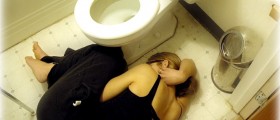Bloated Stomach
Bloating of stomach is usually defined as a feeling of tightness or pulling in the abdomen. This condition is quite common and every person has experienced it at least once in their life. Sometimes, it is not a serious condition, although there are cases when bloating of the stomach is just a symptom of some underlying health condition. In such cases, bloated stomach is usually accompanied by some other symptoms. Bloated stomach can occur even when one does not eat too much.
Bloated stomach depends on the diet and eating habits. When one eats excessively unhealthy foods, or when eating at wrong hours, bloating of stomach is quite common condition. Furthermore, the feeling of bloated stomach one can get when he/she drinks plenty of water right after the meal. Nowadays, people do not have time to prepare the healthy foods at home. Therefore, they consume lot of fast foods, which are not healthy since these foods are very difficult for digestion.
Symptoms of Bloated Stomach After Eating
The most common symptoms of bloated stomach are flabby stomach, vomiting, diarrhea and constipation. When the food is not properly digested, gas forms and accompanies bloated stomach. Furthermore, the indigestion also causes hard distended stomach. When one suffers from bloating of stomach, he/she may feel body discomfort, restlessness and difficulty in breathing. Other symptoms that usually accompany bloated stomach include pain in the chest, unexplained weight loss and poor diet, as well as fatigue, pain on the right side and difficulty in swallowing.
The gut size changes after eating in comparison to the gut size before eating and it is quite normal. However, when the size of the lower abdominal part changes significantly during the day, it is bloated stomach. Darkened stools or bloody stools may also appear along with bloating of the stomach.
Causes of Bloated Stomach After Eating
The feeling of tightness or pulling in the stomach after eating may be caused due to several reasons. In the majority of cases, indigestion is the main cause for the occurrence of bloating of the stomach after eating. Furthermore, gas formation due to improper digestion is also a cause for this condition. Excessive eating, especially oily and spicy foods is also considered to be responsible for the bloated stomach after eating. Bloating of stomach after eating may be caused also by bad eating habits. Not chewing food properly can also lead to the bloated stomach after the meal.
- Some carbohydrates cannot be digested by the enzymes in the small intestine and reach the colon where bacteria metabolize them to hydrogen and carbon dioxide gasses. Examples of such food are bran, cabbage, cauliflower, broccoli, and beans. This can result in excess flatulence in some patients. Many patients experience abdominal cramps, bloating and flatulence when they ingest milk, certain cheeses or ice cream because they lack the enzyme (lactase) which is required to digest milk sugars (lactose). This condition, called lactose intolerance, is less common in people of northern European origin.
- Excessive air swallowing, and certain foods and carbonated beverages are significant contributors to belching and flatulence. Some patients with Irritable Bowel Syndrome (IBS) appear to be uniquely sensitive to normal or only slightly increased volumes of intestinal gas and may develop abdominal cramps as a result. Patients with altered anatomy due to surgery or those with certain rheumatologic diseases may be at an increased risk of bacterial overgrowth in the small intestine which can lead to belching, bloating or flatulence.
- Some patients, particularly women who have had one or more pregnancies, experience abdominal distension when standing erect. This is often assumed to be gas accumulation. However, if the distension is not present when the patient is lying “flat”, then the likely explanation is weak abdominal muscles (which extend from the lower rib cage to the pelvis on both sides of the umbilicus) due to the stretching and loss of muscle tone which occurs during pregnancy.

















Your thoughts on this
Loading...